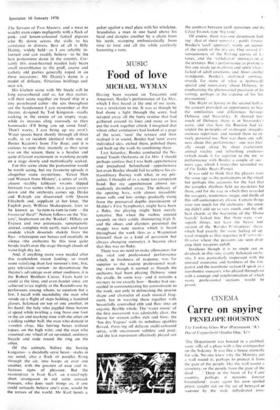MUSIC
Food of love
MICHAEL WYMAN
Having been weaned on Toscanini and Ansermet, Boulez's performance of La Mer, which I first heard at the end of my teens, was a revelation to me. It was as though he had shone a light through the score, had scraped away all the furry residue that had gathered around its lines and more or less put the work together afresh. I imagined that where other conductors had looked at a page of the score, 'seen' the texture and then realised it in sound, Boulez had 'seen' every individual idea, etched them, polished them, and built up the work by combining them.
Last Saturday, Boulez conducted the Na- tional Youth Orchestra in La Mer. I should perhaps confess that I was both apprehensive and prejudiced beforehand—apprehensive lest even Boulez should fail to achieve his ex- traordinary fluency with what, in my pre- judice, I thought of as a none too competent band. But my apprehension almost im- mediately dwindled away. The delicacy of the opening bars, with almost nnaudible drum rolls and low strings gradually rising from the primaeval depths (reminiscent of Mahler's First Symphony), might have been a fluke, the playing might been merely tentative. But when the violins entered securely on their coldly shimmering h;gh B. and the oboes and clarinets presented the snappy two note motive which is heard throughout the work (less as a Wagnerian leitmotif than as a kind of persistent but always changing memory), it became clear that this was no fluke.
There was no need to make allowances for this vital and professional performance which, in freshness of response, was far superior to the routine professional read- ing—even though it seemed as though the orchestra had been playing Debussy since the cradle. In some way—and it remains a mystery to me exactly how—Boulez had suc- ceeded in communicating his commitment to the work, not only in delineating the precise shape and character of each musical frag- ment, but in weaving them together with beautifully controlled ebb and flow into an organic, flexible whole. The 'water music' of the first movement was admirably clear, the theme for sixteen cellos rich and firm; the leu des Vagues' with its nebulous sparkles flowed, throwing off delicate multi-coloured spray, with uncommon subtlety and pace; and the last movement effectively played out
the contrast between gruff stormines and the Cesar Franck-type 'big tune*.
Of course, there was one dimension lack ing. –that of sheer sensnal i,. parth throup Boulez's 'cool' approaet, partly on accour of the youth of the plaNers. One missed t:, sensuousness of the flowing curves of ti tunes, and the 'withdrawn' intoxicaton 0 the textures. But a performance as pristine a. this one made up in charm and spirit c hat lacked of adult emotions; and. from anothe. standpoint. Boulez's analytical annroac reveals far more of what is technicalIN special and innovatory about Dzbussy. 131 emphasising the phenomenal precision of his writing, perhaps at the expense of his lin pressionism'.
The Right of Spring in the second half 0 the concert provided an opportunity to hea the similarities and differences betweer Debussy and Stravinsky. It showed hoc much of Debussy there is in Stravinsky" score, and also how the Russian had ex- tended the principles of arabesque. irregulal ostinato repetition, and turned them to en- tirely personal use. Nor was there any soft. ness about this performance - one was liter ally swept along by sheer excitement animal vitality and refreshing crudenes. (which made it far superior to the BBC SO performance with Boulez a couple of sun- mers ago, which I remember reminded mc of the Teddy Bears Picnic).
It was odd to think that the players were the same age as the participants in the ritual. but perhaps this accounts for the fact that the complex rhythms held no mysteries for them, and for the n ay in which they revealed the savagery. tenderness, magic and thrills of this still contemporary classic. Certain things were too much for the orchestra: the open- ing didn't add up to very much, and the off- beat chords at the beginning of the Danse Sacrale lacked bite. But there were "an' superb things, not least the heavy tutt
version of the 'Rondes Printanieres them, which had exactly the same feeling of up ward struggle as that sequence in If.'senqkNin'• October where the peasants are seen drag ging their weapons uphill.
Invidious though it is to single out in- dividuals in this very. evenly balanced orche stra, I was particularly impressed with the unusual assurance and hardness of the tim- panist and the trombone section (1 speak as a trombonist manqué), who played throughout with a courage and synchronisation of c Inch many professional sections would be proud.


































 Previous page
Previous page